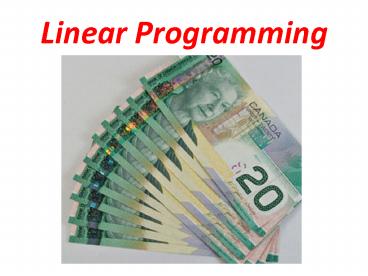Linear Programming - PowerPoint PPT Presentation
Title:
Linear Programming
Description:
Linear Programming Consider the following problem: A tailor has the following materials available in stock: 16 m2 of cotton, 11 m2 of silk and 15 m2 of wool. – PowerPoint PPT presentation
Number of Views:181
Avg rating:3.0/5.0
Title: Linear Programming
1
Linear Programming
2
- Consider the following problem
A tailor has the following materials available in
stock 16 m2 of cotton, 11 m2 of silk and 15 m2
of wool. A suit requires 2 m2 of cotton, 1 m2 of
silk and 1 m2 of wool to produce, while a gown
requires 1 m2 of cotton, 2 m2 of silk and 3 m2 of
wool. A clothing outlet will pay the tailor 150
for each suit and 250 for each gown he produces.
How many suits and how many gowns should the
tailor prepare in order to maximize his revenue
from the sale of these articles of clothing?
3
First we must consider some mathematical theory
and review
4
y
y mx b
x
5
y
y 3x 4
The line is in the region as well
b 4
m 3
test point (0, 0)
LS y 0
x
3
RS 3(x) 4
y gt mx b lies above the line
RS 3(0) 4
1
RS 4
LS gt RS
4
y lt mx b lies below the line
?(0, 0) is in the region
6
y
2x 5y lt 10
a 5
b 2
test point (0, 0)
x
LS 0
5
RS 10
2
LS lt RS
If we solve the inequality for y we get y gt mx
b (above the line)
?(0, 0) is in the region
The line is not in the region
7
y
3x gt 6
?(0, 0) is not in the region
a 2
vertical line
2
test point (0, 0)
x
LS 0
x lt a lies to the left of the line
RS 6
LS lt RS
x gt a lies to the right of the line
8
y
2x y ? 2
Below this line
y ? 1
1
1
x
2
Above this line
x y ? 2
The boundary lines are included
Above this line
2
9
y
Consider the straight line on the x-y plane
y m(x ? a)
y mx b
Ax By C 0
x
Slope Inclination Direction
Point Intercept Position
10
y
y 2x b
The family of lines with slope of 2
x
11
The family of lines with y-intercept 2
y mx 2
y
2
x
12
m is called a parameter (or free variable)
y mx 2
Here are some additional examples
y 3x b
y a(x h)2 k
x2 y2 r2
y logbx c
y asin(x p) q
13
y
The parameter k is part of an expression that
determines the y-intercept (or the
x-intercept).
x
3x 4y k
The slope is always ¾
14
Definitions
The objective function
A linear function (consisting of two variables if
a plane is used) which is to be maximized or
minimized.
The feasible region
The set of interior and boundary points of a
polygon defined by the inequality relations which
specify the restrictions (the constraints) on the
variables used.
The corner points
The vertices of the feasible region (the set of
possible solutions to the problem).
15
The theory of linear programming states that, to
find the optimum value of f, where f Ax By,
we need only test the values of f at the corner
points of the feasible region R.
This assumes that region R is a convex set of
points determined by the intersection of 3 or
more linear inequalities. The region R may be
open (also called bounded) or closed (also called
unbounded).
The region is usually open when we are testing
for a minimum value of f.
16
y
Maximum
A
B
B
C
P
x
D
O
The Objective Function
Q
17
y
Maximums
A
B
B
P
C
C
x
D
O
The Objective Function
Q
18
P
Minimum
y
A
B
B
C
x
D
O
Q
The Objective Function
19
Maximize
150x 250y
R
Product - Resource Chart (figures in m2)
Products Products Resources
Resources Suits (x) Gowns (y) Available
Cotton 2 1 16
Silk 1 2 11
Wool 1 3 15
20
The quantities must be positive
Subject to
2x 1y ? 16
1x 2y ? 11
1x 3y ? 15
x ? 0
y ? 0
21
y
A (0, 5)
E (6.6, 2.8)
16
B (3, 4)
C (7, 2)
5.5
D (8, 0)
5
x
15
11
8
O (0, 0)
22
2x y 16 1
x 3y 15 2
6x 3y 48 3
3 ? 1
3 ? 2
5x 33
x 6.6
Divide by 5
y 2.8
Substituting in 1
Thus, (x, y) (6.6, 2.8)
Point E in previous diagram
23
Table for Testing the Revenue Function
Corner Point Objective Function 150x 250y
A ( 0 , 5 ) R 150(0) 250(5)
B ( 3 , 4 ) R 150(3) 250(4) 1450
C ( 7 , 2 ) R 150(7) 250(2) 1550
D ( 8 , 0 ) R 150(8) 250(0) 1200
O (0, 0) R 150(0) 250(0) 0
1250
1550
Conclusion The maximum revenue can be generated
by producing 7 suits and 2 gowns































